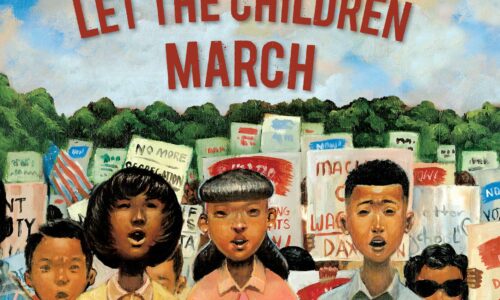In:Books
She Loved Baseball: The Effa Manley Story
by Audrey Vernick
“That’s just the way things are,” people said. But it never made sense to Effa.”
A biography of Effa Manley; a young girl who grew up in America in the early 1900s. As an adult she used her beliefs, knowledge, and passion to repeatedly fight for change. Initially she focused her energy on improving work opportunities for Black Americans. This connected with her love of baseball and lead to her owning a Negro League Baseball team and changing the way Black Athletes and team owners were treated by White owned Major League teams.
Talk About It
- Have you ever heard the word Negroes? Explain to your child that this way of categorizing Black people is no longer used because it implied a sense that they were in some way of less importance or value than White people. (To learn more check out When Did the Word Negro Become Socially Unacceptable.) Ask your child what they think of the idea of using something like skin color to determine things like how smart someone is or what they are capable of doing. Explain that making these kinds of assumptions is called prejudiceCreating ideas about someone we do not know based upon something like skin color or gender. Prejudices are generally negative. More. Acting on these kids of assumptions is called racismThe belief that a person's personality, behavior, & values is based solely upon their race. It is also the belief that one group of people are better than another. More.
- What do you think Effa was thinking and feeling when her teacher assumed she was White and told her she couldn’t play with the other children, her siblings? Talk about how confusing and upsetting it must have been for Effa to be treated differently, more positively, than her siblings just because she happened to have been born with lighter skin. Think about how hard it would be as a 6 year-old to figure out what to do in this situation.
- The teacher explains, “That’s just the way things are.” What do you think about the teacher trying to use this sentence as an explanation for keeping Effa apart from certain kids? Do you think that just because something has always been done a certain way that it makes it okay or should never change? Talk about the fact that sentences like this are excuses used to not have to take responsibility for the choice someone is making or to have to think about the impact of your choice on others. It also stands in the way of creating change.
- As an adult, Effa continues to hear, “That’s just the way things are.” Now it’s in reference to Black people not being able to own businesses or get certain jobs. What do you think about this? Why do you think things hadn’t changed? Talk about Jim CrowA set of laws in the South in the late 1800s-early 1900s that kept Black people separate from Whites in places like schools, transportation, restaurants, etc. The laws were also used to keep Black citizens from voting. They were named after an African American character in a song. The laws were made illegal with the passing of the Civil Rights Act of 1964 and the Voting Rights Act of 1965. More and how these laws were used for decades to prevent Black Americans from being treated equally. Be honest about the fact that there are still many times when Black Americans and other people of color are denied opportunities because of their raceWhen people are grouped based upon certain physical characteristics; most commonly skin color. More. What do you as a family think about this fact?
- What do you think about Effa using her energy to form a community organization and protest unfair treatment? Would you want to eat, shop, etc at a store that would take your money but wouldn’t let you work there because of your skin color (or any other part of your appearance that you had no control over)?
- What did you think when you learned that the boycottWhen people refuse to buy certain things, go to certain places, or do specific tasks in order to create changes in rules or actions that are hurting some people. More by Effa and her community was successful? Why do you think she proudly kept the newspaper article. Talk about how sometimes it takes courageDoing something even when you know it will be hard. More and standing up for what you believe, even when people try to convince you otherwise, to move progress forward.
- Have you ever heard of the Negro National League? Talk about why there was a need for a baseball league for Black athletes. For more information read the article Negro League Baseball and talk about what you learn.
- Point out that Effa was a very intelligent and driven woman who not only refused to do things as they had been related to her raceWhen people are grouped based upon certain physical characteristics; most commonly skin color. More but also her gender. She helped organize a movementA group of people acting as one because of a shared belief. More as well as start and run a baseball team. You can highlight that women, at that time, were not seen as capable of running businesses.
- Why do you think Effa’s “proudest moment” came when her team won the Negro League World Series? Share how reading about the game and win made you feel for the players and for Effa.
- Make sure your child understands what it means that players have contracts. Do you think it was fair that major league baseball teams would sign players from the Negro league without paying the owners of the team? Explain how this was a form of discriminationWhen someone is treated unfairly or differently because they belong to a particular group. For example race, age, gender, sexual orientation, or gender identity. More in which White team owners didn’t feel they should have to treat Black team owners fairly.
- Effa used her voice to speak out about this discriminatory behavior. How do you think it made her feel to start to hear people ask “but why” instead of sticking with the line she usually heard. Again, Effa found a way to take action and create change. What can you learn from this?
- Why do you think Effa got so upset thinking about the history of the Negro leagues disappearing? How did she channel that energy? What change did she create this time?
- What did you think or feel when you saw that Effa was honored by the Baseball Hall of Fame? Be sure to share your thoughts and feelings with your child.
- What can we learn from Effa’s life?
Explore More
- Take some time to learn more about Effa Manley. Watch Effa Manley – Behind the Plaques or Effa Manley and the Newark Eagles. Listen to the podcast Amazing Businesswomen in History: Meet Tenacious Effa Manley. Read The First Lady of Black Baseball; Effa Manley, Queen of the Negro Leagues; or Effa Manley.
- Learn more about the Negro League and share ideas about why it was so important, including how it changed history. Watch Negro League History or Hank Aaron on the Negro Leagues. You can also find several documentaries on Youtube. If your child is really interested in baseball, start reading about some of the players mentioned in this book.
- The beginning of the book mentions the birth of jazz music as part of setting the scene for Effa’s life. Spend some time learning more about the history of Jazz music and listening to the music. Point out how music is a way to express our thoughts and feelings; then listen to a song and think about what the musicians are trying to say with and without words. To learn more check out: What is Jazz; Jazz Facts for Kids; Jazz Music History for Kids Song; Understanding Jazz for Kids; and History of Jazz.
- A constant theme in Effa’s life was finding ways to take active steps to bring about positive change. Talk about forms of discriminationWhen someone is treated unfairly or differently because they belong to a particular group. For example race, age, gender, sexual orientation, or gender identity. More and racismThe belief that a person's personality, behavior, & values is based solely upon their race. It is also the belief that one group of people are better than another. More that still exist within our country. (Visit our resource page Learn More About It: Race & Racism for resources to explain these concepts to children). Some examples include differences in what people get paid for doing the same job, unfair treatment by the police, lessons taught in school tending to be centered in White history, and our government continuing to take land and resources away from Indigenous tribes. Think about what actions your family can take to stand up, speak out, and create change. These can include contacting political officials with policy changes you would like to see; putting together ideas for expanding learning to include a more diverse understanding of American history and the cultures within our country and then sharing it with your teacher, school, or city school board; doing a fundraiser for an organization whose work you believe in; etc.
- Create a list of other people of color in American history who have fought for changes in equality (however big or small) that you would like to learn from. Maybe even turn this in to an informative slideshow you can share with others.




